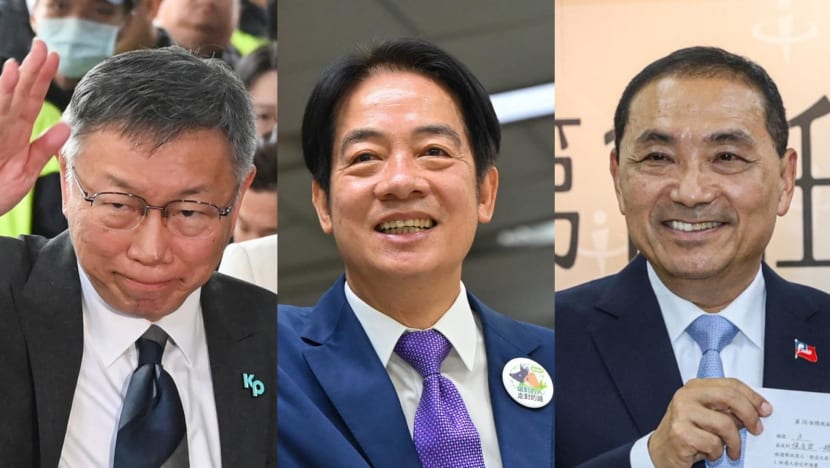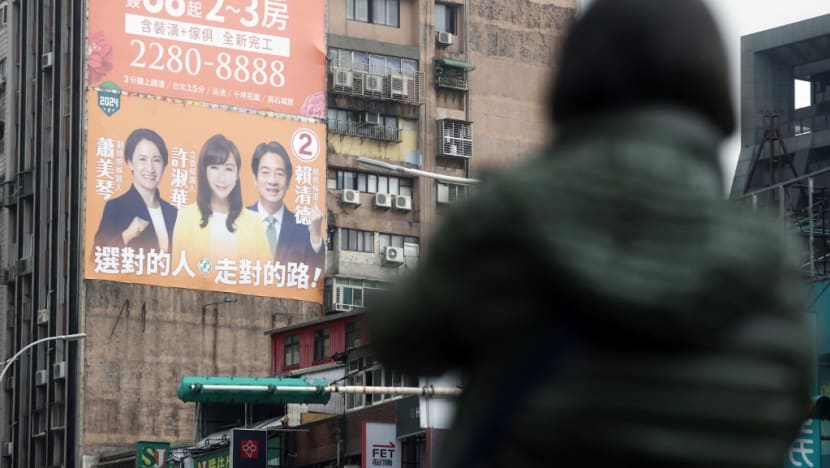How Taiwan’s voters will choose their next president
Who are the presidential candidates and what's at stake as Taiwan voters head to the polls on Jan 13?

(from left) Presidential candidates Ko Wen-je, Lai Ching-te and Hou Yu-ih. (Photos: AFP)

This audio is generated by an AI tool.
Taiwanese voters will choose their next president and legislature when they go to the polls in January, with the results helping set the course for both cross-strait and US-China relations in the years ahead.
The election is a competitive three-way race, with the ruling Democratic Progressive Party seeking to maintain Taiwan’s de facto political independence.
A win from the opposition Kuomintang would herald closer ties with China, while newcomers, the Taiwan People’s Party, represent a middle-of-the-road stance that includes some dialogue with Beijing.
HOW DO THE ELECTIONS WORK?
On Jan 13, around 19.5 million eligible Taiwanese, among them 1 million first-time voters, will be able to cast ballots at almost 18,000 polling stations to choose a new president and vice president.
The minimum voting age is 20, with absentee or early ballots not allowed.
Polling stations open from 8am to 4pm with the result likely to be clear by around 8pm on voting day, according to past experience.
The new president will take office on May 20.
Related:
WHO ARE THE CANDIDATES?
The front-runner is Vice President Lai Ching-te of the ruling DPP. The Harvard-educated former kidney doctor once described himself as a “political worker for Taiwanese independence”. He has toned down that stance as President Tsai Ing-wen’s deputy, saying Taiwan is already a de facto "sovereign country" in need of greater international recognition.
If elected, Lai has vowed to continue working with the US and other democracies to maintain the status quo. In a sign of his commitment to strong ties with Washington, he has picked Hsiao Bi-khim, Taiwan’s former de facto ambassador to the US, as his running mate.

New Taipei City Mayor Hou Yu-ih, a popular local leader with little foreign policy experience, is running for the opposition KMT.
Hou has said he opposes Taiwanese independence but rejects Beijing’s “one country, two systems” formulation for bringing the island under its control. His running mate is television presenter and media owner Jaw Shaw-kong.
The TPP’s candidate is Ko Wen-je, who has positioned himself as an outsider aiming to topple the two traditional parties.
He picked Cynthia Wu, a lawmaker from one of Taiwan’s wealthiest families, as his running mate.
Talks between the KMT and TPP over a unified campaign collapsed after neither side could agree on who would lead the ticket.
WHAT'S AT STAKE IN THE ELECTION?
The January election will determine the level of tensions across the Taiwan Strait. Should the DPP remain in power, the US would retain a willing partner in its efforts to push back against China, straining ties with President Xi Jinping’s government.
A victory by either of the challengers could de-escalate relations with Beijing, for a while at least. The KMT is China’s preferred negotiating partner, and both Hou and the TPP’s Ko have said they plan to restart direct talks. The DPP argues it is the only party able to stand up against Beijing’s increasingly assertive stance.
Still, all candidates know that most Taiwanese people prefer to maintain the deliberately ambiguous status quo rather than seek unification or formal independence, according to polls.
WHAT ELSE IS HAPPENING ON ELECTION DAY?
Other than choosing the president, voters will also be handed two more ballots that will decide the make-up of the single-chamber legislative body.
One will pick their local lawmaker, the other will choose their preferred political party - which will decide how many legislators-at-large each party gets. There are 113 seats in the legislature, with the DPP currently holding over 60 and the KMT under 40.
If neither party can win at least 57 seats, the next president will find it difficult to pass Bills and effect much meaningful change.
One quirk of the system is the new lawmakers will start their term from February, which means outgoing President Tsai will need to work with a newly composed legislature for the final months of her tenure. That tension could prompt a return to the rambunctious scenes Taiwan’s lawmakers are renowned for.
WHAT HAVE THE US AND CHINA SAID ABOUT THE ELECTION?
Concerns around election interference by external forces have been a consistent feature of the campaign.
US officials in charge of relations with Taiwan have repeatedly said Washington has no preferred candidate and they will respect the voters’ choice.
China has been more forthright. Beijing views Taiwan as part of its territory, a claim it has vowed to back up with the use of its military, if necessary. In November, China’s Taiwan Affairs Office urged voters to “oppose independence” and make the right choice when facing peace or war, prosperity or recession, according to a China Central Television report.
Liu Pengyu, spokesman for the Chinese embassy in the US, has warned the outcome of January’s elections may affect Beijing’s relations with Washington. President Joe Biden made clear to Xi during a meeting in November that his government would oppose any Chinese attempt to sway voters.













